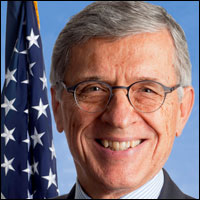
United States Federal Communications Commission Chairman Tom Wheeler has responded to the White House’s proposal for Net neutrality rules by reasserting his agency’s independence in a meeting with executives of Google, Yahoo and other Internet companies following President Obama’s Monday call to action.
The president urged the FCC to ensure Net neutrality by interpreting Title II of the Telecommunications Act to govern ISPs.
While Wheeler’s response is viewed in some quarters as a challenge to the president, the FCC has said that Wheeler is taking the president’s comments under advisement.
“Reports that Chairman Wheeler has decided on the best approach for implementing legally sustainable open Internet rules are inaccurate,” FCC spokesperson Kim Hart told TechNewsWorld.
“No decision has been made,” she continued. “All options remain on the table, including Title II reclassification.”
Just Setting Out the Rules
“I don’t think [Wheeler] was proclaiming that he is going one way or another when referencing the president’s statement,” Doug Brake, telecom policy analyst at the Information Technology & Innovation Foundation, told TechNewsWorld.
“As a point of administrative law, the FCC is an independent agency,” Brake continued. “I think Wheeler was acknowledging this fact, and not necessarily saying he is ignoring [the president].”
Such distancing is required by law, Brake pointed out, adding that “our expert agencies are — to an arguable degree in practice, but at least in theory — independent from the executive branch so that they can be insulated from political pressure.”
The Politics of the Issue
Nonetheless, politics has more to do with this issue than technology does.
“A lot of the push for Title II has been from liberal-leaning organizations that see this as the necessary first step towards full-blown utility-style price regulation or unbundling of network elements,” Brake suggested.
These groups have “been very successful in framing what should be a narrow question of jurisdiction as a fight over saving the Internet, which has become much more political than it has any reason to be,” he said.
Various populist organizations have launched campaigns pushing for Title II regulation of ISPs, but “if there’s broad populist support for a particular type of Net neutrality rules that the FCC … does not believe it has the proper jurisdiction to implement, then the forum for that political support is Congress, not the FCC,” Brake explained.
However, industry groups and carriers are not innocent of making attempts to influence Wheeler’s views.
What Business Is Doing
Verizon CFO Fran Shammo on Wednesday told investors he was confident the FCC would make the right decision, according to reports. The carrier has been pushing the FCC to go with Section 706 — and threatening litigation otherwise.
However, Verizon earlier this year won its challenge to the FCC’s jurisdiction over its use of Section 706 and won. It’s difficult to understand why it now wants Section 706 rules reinstated.
Meanwhile, T-Mobile USA CEO John Legere has taken to Twitter over the issue, launching a tweetstorm against “overzealous regulation.”
In sum, Legere is for Section 706 but not for Title II.
Comcast has said Title II regulation would hurt future innovation, and AT&T reportedly has suspended plans to roll out high-speed fiber connections to 100 cities until the FCC comes to a decision.
The cable industry has donated heavily to U.S. politicians opposing Title II, including John Boehner, R-Ohio, speaker of the U.S. House of Representatives.
Where’s the Voice of the People?
“Americans … understand how money disproportionately influences democracy and shuts them out of the political process, advancing instead the agendas of moneyed interests,” Daniel G. Newman, cofounder and president of MapLight told TechNewsWorld.
“Who will the government listen to — the millions of citizens who expressed their views on Net neutrality and the hundreds of millions who will be affected?” Newman asked. “Or a handful of corporations who have spent millions investing in politicians?”























































Doesn’t Wheeler serve at the pleasure of the President? Bye Tom.
Why is it that they just can’t get a person that knows what they are doing or doesn’t have ties in this position?